FT-IR spectrometers at a glance: products, function and application
An FT-IR spectrometer (Fourier transform infrared spectrometer) analyses the absorption of infrared light by a sample to identify its molecular structure and chemical composition. This page provides an overview of products from different manufacturers.
Are you looking for general information on the topic? Our guide gives you all the important information on how it works and how to use it.
FT-IR spectrometers at a glance: products, function and application
An FT-IR spectrometer (Fourier transform infrared spectrometer) analyses the absorption of infrared light by a sample to identify its molecular structure and chemical composition. This page provides an overview of products from different manufacturers.
Are you looking for general information on the topic? Our guide gives you all the important information on how it works and how to use it.
FTIR spectrometers at a glance
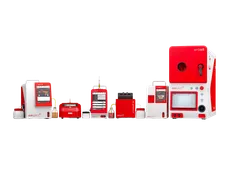 New
Neweralab OCM by eralytics
In-house Oil Condition Monitoring Solution
ERALAB OCM offers a range of easy to use, rugged and accurate oil analyzers
The advanced ERASOFT OCM software forms a symbiotic unit with the related eralab OCM analyzers ✓ Efficient collection, analysis and interpretation of oil analysis data in real time ✓ Individual combination of analyzers according to the customer's needs ✓
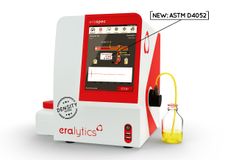
ERASPEC by eralytics
Spectral Fuel Analysis in Seconds with ERASPEC
Fast delivery of over 40 fuel parameters at the push of a button
Comprehensive fuel composition analysis for gasoline, diesel fuel and jet fuel at the push of a button in the lab and on-site ✓ Pre-installed and easily expandable & transferable databases ✓ Standards: ASTM D5845, D6277. D7806, D4052, D7777, EN238, EN14078, etc ✓
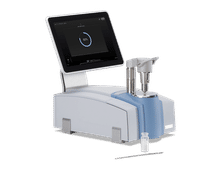
ALPHA II by Bruker
Chemical analysis made easy: compact FT-IR system
Increase the efficiency of your routine analyses with user-friendly technology
OPUS TOUCH software simplifies the user experience ✓ RockSolid" technology ensures maximum reliability and durability ✓ Compact design perfectly matches your application ✓
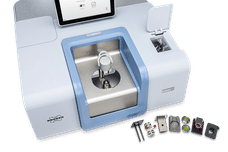
INVENIO by Bruker
FT-IR spectrometer of the future: INVENIO
Freely upgradeable and configurable FT-IR spectrometer
IR spectrometer for research and demanding analysis ✓ The world's most advanced interferometer & detector technology ✓ 100% designed for reliability, productivity and highest data quality ✓
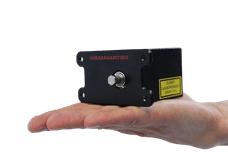
FTIR engine by Hamamatsu Photonics
1129500
Real-time measurements from 1100 to 2500 nm directly on site
Fourier transform infrared spectrometer ✓ Ultra compact ✓ High-sensitivity NIR measurements ✓ Minimal dark current ✓s
Buy FTIR spectrometers for the lab or the production process
Related product categories
Find more FTIR spectrometers content in our topic worlds
Topic World Spectroscopy
Investigation with spectroscopy gives us unique insights into the composition and structure of materials. From UV-Vis spectroscopy to infrared and Raman spectroscopy to fluorescence and atomic absorption spectroscopy, spectroscopy offers us a wide range of analytical techniques to precisely characterize substances. Immerse yourself in the fascinating world of spectroscopy!

Topic World Spectroscopy
Investigation with spectroscopy gives us unique insights into the composition and structure of materials. From UV-Vis spectroscopy to infrared and Raman spectroscopy to fluorescence and atomic absorption spectroscopy, spectroscopy offers us a wide range of analytical techniques to precisely characterize substances. Immerse yourself in the fascinating world of spectroscopy!
Guide to FT-IR spectrometers: Everything you need to know, clearly explained
FT-IR spectrometers, also known as Fourier transform infrared spectrometers, are analytical instruments used to determine the molecular composition of samples. These devices use the principle of Fourier transform infrared spectroscopy (FT-IR) to measure the infrared spectrum of a sample. In this process, the interaction of infrared radiation with matter is examined, which allows specific information about the chemical structure and molecular composition of the sample to be obtained. FT-IR spectrometers are of great importance in science and industry because they enable a wide range of materials to be analysed quickly, accurately and non-destructively.
FT-IR spectroscopy has established itself as an extremely versatile method and is used in a variety of disciplines. Among the most common areas of application are chemical analysis, environmental monitoring, quality control in production and pharmaceutical research. The ability to analyse a wide range of sample types – solid, liquid or gaseous – means that FT-IR spectrometers can be used for a broad range of applications, making them an indispensable tool in modern analytics.
Advantages of FT-IR spectroscopy
Precise chemical analysis and fast results
One of the biggest advantages of FT-IR spectrometers is their ability to provide precise and reliable results in the shortest possible time. The method enables comprehensive chemical analysis by identifying characteristic infrared absorption bands that are associated with specific chemical bonds in a sample. Compared to other analytical methods, such as chromatographic or mass spectrometric analysis, FT-IR spectroscopy offers faster and easier sample preparation. In many cases, no elaborate sample preparation is necessary, which significantly reduces the overall analysis time.
Applicability to different sample types
FT-IR spectrometers are extremely flexible to use because they can work with different sample types. Whether they are solids, liquids or gases, FT-IR spectrometers can analyse a wide range of materials. This versatility makes them particularly useful in areas where a wide range of samples need to be analysed, such as in environmental analysis or the food industry.
Compared to other spectroscopy methods
Compared to other spectroscopy methods such as Raman spectroscopy, FT-IR spectroscopy has some specific advantages. While Raman spectroscopy is often more sensitive to water and less suitable for the analysis of aqueous samples, FT-IR spectroscopy offers better signal strength and is less susceptible to interference from water. In addition, FT-IR spectroscopy is often less expensive and easier to implement than Raman spectroscopy, making it the preferred method for many applications.
Product Overview
1. Compact FT-IR Spectrometers
Compact FT-IR spectrometers are ideal for use in laboratories with limited space or for applications that require a high degree of mobility. These devices are usually smaller and lighter than their high-resolution counterparts, but still offer impressive performance. Typical features of compact FT-IR spectrometers are user-friendly operation, fast analysis and high reproducibility of measurement results. They are often used in quality control, research and education. Examples of applications include the analysis of plastics, the inspection of raw materials and the examination of environmental samples.
2. High-resolution FT-IR spectrometers
High-resolution FT-IR spectrometers are characterised by their ability to capture very fine details in the infrared spectrum of a sample. These devices are particularly useful for applications in research and development where a high spectral resolution is required. They enable the identification and quantification of complex mixtures and are therefore invaluable for demanding analytical tasks in materials science and chemical research. Typical applications include the study of polymorphism in pharmaceutical compounds, the characterisation of thin layers and the analysis of gases.
3. Portable FT-IR spectrometers
Portable FT-IR spectrometers are designed for use outside the laboratory and enable on-site analysis. These devices are particularly robust and suitable for use in harsh environments. They are frequently used in environmental monitoring, in the petrochemical industry and in archaeology. Portable FT-IR spectrometers enable the fast and reliable identification of materials and are ideal for the mobile analysis of soil samples, works of art or unknown substances in emergency response.
Areas of application
1. pharmaceutical industry
In the pharmaceutical industry, FT-IR spectrometers play a central role in quality control and the identity testing of raw materials. FT-IR spectroscopy enables the chemical identity of active ingredients and excipients to be verified quickly and reliably, which is essential for the production of safe and effective drugs. Another important area of application is the investigation of polymorphisms, as different crystalline forms of an active ingredient can have different physical and chemical properties that affect the efficacy and stability of a drug.
2. Environmental analysis
FT-IR spectrometers are used in environmental analysis to monitor pollutants in water, soil and air. They enable the rapid and precise detection of organic and inorganic compounds that could pollute the environment. A typical application is the analysis of volatile organic compounds (VOCs) in the air released from industrial plants. FT-IR spectrometers are also used to monitor water quality, for example by detecting pesticides, herbicides and other organic pollutants.
3. food industry
In the food industry, FT-IR spectrometers are used to analyse ingredients and detect contaminants. They enable the chemical composition of food to be checked quickly and help to ensure product quality and safety. Typical applications include the analysis of fatty acid profiles in oils, the determination of protein content in dairy products, and the detection of foreign substances such as melamine in milk powder. The ability to analyse samples quickly and non-destructively makes FT-IR spectrometers a valuable tool for quality assurance.
Case studies and specific product recommendations for each industry
Pharmaceutical industry: For the identity verification of raw materials and the analysis of polymorphisms, high-resolution FT-IR spectrometers such as the "PerkinElmer Spectrum 3" are recommended.
Environmental analysis: Portable FT-IR spectrometers such as the "Agilent 4300 Handheld FT-IR" are ideal for on-site analysis of air and soil samples.
Food industry: Compact FT-IR spectrometers such as the Bruker Alpha II are ideal for routine food analysis.
Technology and innovations
FT-IR spectrometers are based on various technological principles that significantly influence their performance and possible applications. The most important technologies include:
ATR (Attenuated Total Reflectance) technology
The ATR technique allows the analysis of samples with minimal sample preparation. In this technique, the sample is brought into direct contact with a high-refractive crystal that introduces infrared light into the sample. This enables quick and easy analysis, especially of solid and pasty samples.
Interferometer types
The interferometer is the heart of an FT-IR spectrometer. Different interferometer types, such as the Michelson interferometer, influence the resolution and sensitivity of the device. New developments in interferometer technology, such as ultra-fast scanning or the use of quantum cascade lasers, have significantly increased the performance of FT-IR spectrometers.
Latest developments and innovations
Modern FT-IR spectrometers are increasingly equipped with intelligent software solutions that enable automatic interpretation of spectra. These software solutions use machine learning algorithms to automatically identify and quantify samples. In addition, some of the latest devices are equipped with portable and wireless capabilities that enable seamless integration into industrial IoT systems.
Buying guide: How to choose the right FT-IR spectrometer?
Selecting the right FT-IR spectrometer depends on various factors that should be carefully considered before making a purchase:
Sample type: What kind of samples are to be analysed? Liquid, solid or gaseous samples require different sample holders and measurement methods.
Area of application: What will the instrument be used for? High-resolution instruments are often required for research, while compact models may be sufficient for quality control.
Budget: There is a wide range of prices for FT-IR spectrometers. From low-priced, compact models to high-resolution devices in the upper price range, everything is available.
Checklist for the purchase:
- Determine the type of samples to be analysed.
- Define the required resolution.
- Consider the space requirements and mobility of the device.
- Plan the available budget.
- Find out about maintenance and service offerings.
FAQs
How often does an FT-IR spectrometer need to be calibrated?
Calibration should be performed regularly, at least once a year. With intensive use, more frequent calibration may be required.
What sample preparation is required for an FT-IR spectrometer?
Sample preparation depends on the sample type. Liquids can be analysed directly, solids often require grinding, and gases are measured in special gas cuvettes.
How long does a typical FT-IR analysis take?
Analysis time varies depending on the sample and the instrument, but is typically between a few seconds and a few minutes.
Can an FT-IR spectrometer be used in dusty or humid environments?
Yes, there are specially protected FT-IR spectrometers for use in industrial or harsh environments. These devices are robust and resistant to external influences.
With this comprehensive information and tips, you should be well equipped to select the right FT-IR spectrometer for your needs and use it optimally.
Haven't found the right product yet?
The chemeurope.com Product Search
Start your targeted search now with a wide selection of filter options. Here you can easily find the right product for your search, including manufacturer information and options for requesting a quote or downloading the corresponding brochure.



